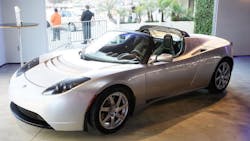Worker Discontent Makes Tesla a Union Target
Tesla Motors is widely held up as the future of American automaking, bringing the Silicon Valley startup culture to a staid industry. The United Auto Workers union, by contrast, is often cited as one of the most regressive forces in the business, miring the companies whose workforces it represents in adversarial and inefficient relationships. So what happens when these seemingly irreconcilable forces meet? With any luck, a compromise that will push the UAW into modern relevance and allow Tesla to make the much-needed transition into a successful manufacturing culture.
As the only U.S.-based automaker without a UAW-represented workforce--and as the occupant of a former UAW-represented plant--Tesla has been on the union's radar for some time. In the past, Tesla's tiny startup scale and the UAW's focus on organizing Volkswagen's Chattanooga, Tenn., plant kept a confrontation on the back burner.
But with Tesla moving toward half a million units of production per year, and in the wake of accusations that it pays foreign visa holders as little as $5 per hour, the electric car maker is being watched very closely by the union, UAW President Dennis Williams said last week. "We just believe workers ought to have a voice in the workplace, and they ought to have collective bargaining rights."
Tesla denied any knowledge of underpaid foreign workers at its Fremont, California, plant in a recent blog post, arguing that subcontractors are responsible for any potential violation of labor law, but the company doesn't deny that it works its employees hard. In a statement responding to the UAW's overtures, Tesla said:
There is no doubt that Tesla employees work harder than most. Changing the world is not a 9-5 job. We make this very clear to all candidates when they apply to work at Tesla. At times, during heavy production ramp, some shops in the factory may have to work on Saturdays. We give everyone advance notice when this is required to ensure they can plan their schedules accordingly. We also provide alternate work schedules for many of our production shops that include compressed work weeks allowing for more flexibility and schedule predictability.
This is a generous picture of the working conditions at Tesla, at least according to such job-review websites as Indeed and Glassdoor. Though some current and former Tesla employees describe the company as an intensely challenging and thus rewarding place to work, the widely shared verdict is that it allows for little work-life balance.
Many employees describe 12-hour shifts and six-day weeks as typical--if not mandatory --and describe a wide range of health, family and morale issues that arise from Tesla's hyperdriven corporate culture. And though the company maintains a startup-like pace as it rushes to meet Chief Executive Officer Elon Musk's ambitious goals, worker reviews indicate that the flexibility and mobility of a true startup have evaporated as the company has grown to support a workforce of more than 10,000 full-time employees.
It's a fascinating dynamic of American working life: Though Silicon Valley's startup culture has opened corporate America's eyes to a lack of drive, mission orientation and flexibility in its own work cultures, so too has the startup mythology blinded many to the exploitation of workers. In the early stages of a company's development, long hours and relentless pressure are rewarded with both the flexibility to work on a variety of intellectually satisfying projects and equity positions that leave early employees independently wealthy. But as companies grow, the benefits of a pure startup culture tend to evaporate, while the negatives exact a heavy toll on recruitment, retention and workplace harmony.
The UAW, meanwhile, represents the opposite extreme. Born in the most profitable era of the U.S. auto industry, the UAW's demands for high pay and strict workplace rules have created a culture of apathy, entitlement and confrontation that has materially hurt Detroit employers as competition ramps up.
Leadership at the UAW--and likewise at Tesla--pines for a work culture whose moment has passed and seeks to sustain it not out of self-interest but out of dedication to a broader mission. Whereas Tesla has created a toxic work culture in its desire to unleash youthful enthusiasm, the UAW has created just as toxic a culture by forcing young workers to take the brunt of the union's concessions in order to preserve older workers in the comfort to which they've become accustomed.
Given the broader polarization of American life, especially along divisions of age, it may well be unreasonably optimistic to expect the avatars of a disappearing manufacturing-based middle class and an ascendant startup culture to reach a meaningful compromise. Musk is not known for shying away from public-relations controversies, and his pop culture and social media firepower make him a formidable target for the broadly unpopular UAW.
Still, such a compromise holds the promise of a brighter future: for the UAW, as it seeks relevance in the modern economy; for Tesla, as it seeks to build a culture capable of high-quality mass manufacturing; and for an American economy that is torn between two equally unsustainable work-culture philosophies.
If both sides can commit to a compromise that makes the other equally unhappy, the ultimate winner will be the American economy.
This column does not necessarily reflect the opinion of the editorial board or Bloomberg LP and its owners.
